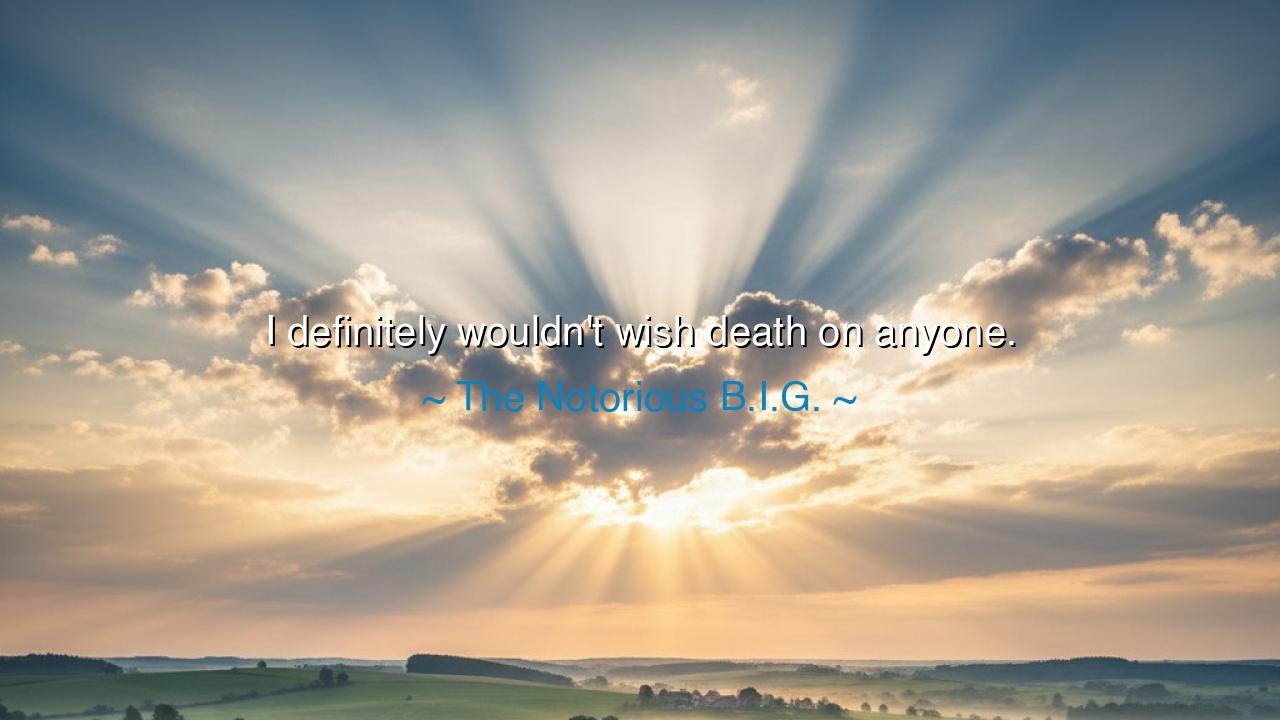
I definitely wouldn't wish death on anyone.






The rapper The Notorious B.I.G., born Christopher Wallace, once said: “I definitely wouldn’t wish death on anyone.” These words, though simple, rise from a life shadowed by danger, loss, and the constant nearness of mortality. Spoken by a man who lived within the storms of violence and fame, they carry the weight of reflection — the wisdom of one who has seen death’s face too many times and learned to respect its power. In his statement, Wallace captures a truth that transcends music and culture: that death, when understood deeply, is not a punishment to be invoked upon another, but a universal sorrow that binds all humanity together.
In the world from which Biggie came — the streets of Brooklyn in the 1980s and 1990s — death was not an abstraction. It was present, palpable, waiting around every corner. Friends fell young; dreams were buried early. To survive was an act of strength, but also of grace. And yet, even in this harsh reality, Wallace’s words remind us of the sacredness of life. For those who have seen death closely are often the ones who learn to value life most. To say “I wouldn’t wish death on anyone” is to reject the cycle of hatred and vengeance that consumes so many — to rise above the instinct of retaliation and embrace compassion instead. It is the voice of a man who has suffered, but not allowed suffering to harden his heart.
In a sense, this quote echoes the ancient philosophy of mercy that has appeared across civilizations. The wise of old — from Confucius to Christ, from Marcus Aurelius to the Buddha — all taught that to wish harm upon another is to wound one’s own soul. They understood that death is not justice, but the end of all possibility for redemption. The ancients knew what Biggie intuited from his own life: that the true victory is not in destroying one’s enemies, but in refusing to become like them. To wish death is easy; to wish healing is divine.
Consider the example of Nelson Mandela, who spent twenty-seven years imprisoned by those who feared him. When he emerged from his cell, he did not call for revenge, though the world would have understood if he had. Instead, he chose forgiveness. “Resentment,” he said, “is like drinking poison and hoping it will kill your enemies.” Mandela understood, as Biggie did in his way, that hatred leads only to decay. Those who wish death upon others invite death into their own hearts. To reject that temptation is to claim spiritual freedom — the freedom that comes from mercy, not malice.
In The Notorious B.I.G.’s life, there was both tragedy and transcendence. He rose from poverty to become one of the greatest poets of his generation, yet fame could not protect him from the violence that haunted his past. When he spoke of not wishing death upon anyone, he spoke as one who had lost friends, rivals, and perhaps a piece of himself to that endless struggle. His words carry the humility of experience — the realization that life is too fragile, too brief, to be spent summoning darkness upon others. His message, like the wisdom of the ancients, calls us to rise above vengeance and to recognize that every life, even the flawed and fallen, carries sacred worth.
This quote, then, is not only about death — it is about life, and how we choose to live it. To not wish death upon another is to affirm our shared humanity, to declare that love and understanding are greater than hatred. It means learning to see even one’s enemies as fellow travelers on the same fragile journey. In a world where violence still reigns, Biggie’s words are a quiet but powerful act of rebellion — a reminder that peace begins in the heart that refuses to hate.
Let this be the lesson: never wish for another’s destruction, even in anger or pain. For every life carries the same breath that animates your own, and to call for its end is to darken your own light. When you are wronged, seek justice, not vengeance. When you are hurt, seek healing, not hatred. Speak words that build, not destroy. And when death comes — as it will for all — let it find you as one who honored life in others as fiercely as your own.
For in the end, The Notorious B.I.G.’s words stand as a testament to the wisdom born of struggle: “I definitely wouldn’t wish death on anyone.” To live by that truth is to walk the higher path — to rise above the violence of the world, to choose compassion over cruelty, and to leave behind not destruction, but peace. And in that choice lies the only immortality worth seeking — the immortality of the heart.






AAdministratorAdministrator
Welcome, honored guests. Please leave a comment, we will respond soon